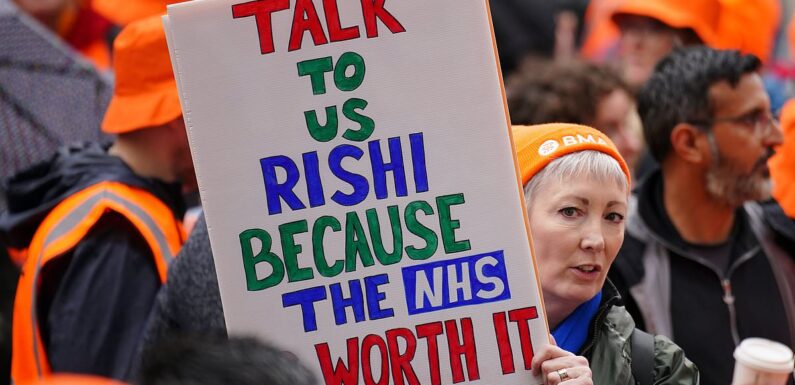
Strikes have cost the NHS £2 billion in lost appointments and overtime… and they’re not over yet
- Bosses admitted junior doctors could not have chosen a worse time to walkout
Industrial action has now cost the NHS more than £2billion in lost appointments and overtime for staff who covered for striking colleagues, officials have revealed.
The figure was disclosed yesterday at an NHS England board meeting, where bosses admitted junior doctors could not have chosen a worse time to walkout than over Christmas and New Year.
Richard Meddings, chairman of NHS England, said the upcoming pickets will be disruptive and put the health service under ‘very real pressure’.
His comment were echoed by Amanda Pritchard, its chief executive, who called on the medics and Government to resume negotiations.
She warned strikes will ‘inevitably’ have an impact on patient care and could make this winter the worst ever for the health service.
Richard Meddings, chairman of NHS England, said the upcoming pickets will be disruptive and put the health service under ‘very real pressure’. Pictured: BMA and UNIT trade unions march around Royal London Hospital on October 4
Amanda Pritchard, its chief executive, warned strikes will ‘inevitably’ have an impact on patient care and could make this winter the worst ever for the health service. Pictured: Protest outside the Mancheser Library during the Conservative Party annual conference
Walkouts this month are likely to coincide with a surge in winter viruses as well as casualties from Christmas parties. Pictured: File image
Junior doctors will abandon their posts for three days this month and six more at the start of January as they seek a 35 per cent pay rise.
The walkouts are likely to coincide with a surge in winter viruses as well as casualties from Christmas parties.
Mr Meddings said: ‘We’ve already essentially dealt with 40 days, I think, of industrial action across the NHS this year.
‘And I will say that the days chosen now by the junior doctors could not be at a worse time.
‘In the run up before Christmas and in that first week of January, that’s a really really difficult time for the NHS to manage.
‘I know actually that the NHS will rise to it and will work hugely hard to meet the consequences of that disruption. But actually, it will put the NHS under very real pressure.’
Ministers and representatives from the British Medical Assocation have been locked in negotiations for five weeks.
But the union said its junior doctors committee had voted unanimously for further strikes after accusing the Department for Health of failing to put forward a credible offer.
Junior doctors will abandon their posts for three days this month and six more at the start of January as they seek a 35 per cent pay rise. Pictured: Healthcare workers hold placards at a picket line outside St Thomas’ Hospital in London on February 6
Ministers and representatives from the British Medical Assocation have been locked in negotiations for five weeks. Pictured: A protester holds a placard while chanting in support of fair pay during the Conservative Party Conference
It means junior doctors in England will walk out from 7am on December 20 to 7am on December 23 and from 7am on January 3 to 7am on January 9 – the longest walkout in the history of the NHS.
Junior doctors were offered a 3 per cent rise on top of the average 8.8 per cent in the summer.
But the BMA said the cash would have been split unevenly across different medical grades and would ‘still amount to pay cuts for many’.
Mrs Pritchard told the board meeting: ‘The industrial action announced this week by the BMA, I think is top of everyone’s mind, and worry lists.’ She said the NHS had been improving week-on-week since the last walkout, helping to reduce long waits for care.
Further industrial action is ‘incredibly disappointing… particularly because it comes at an already very challenging time for the NHS,’ she added.
Sir Julian Hartley, chief executive of NHS Providers, which represents NHS trusts, said: ‘A year of strikes has had a huge financial impact on the NHS, with around £2billion in lost income from delayed operations, scans and procedures and the direct costs of providing cover for striking staff.
‘At a time when NHS budgets are under serious strain, this is a cost the health service can ill afford.’
Source: Read Full Article




